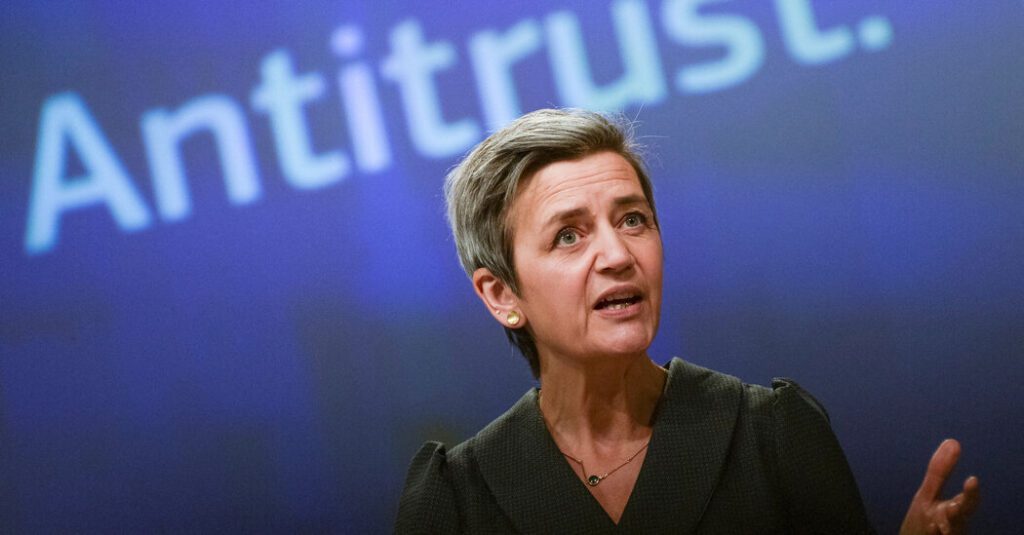Regulators in Brussels said on Monday that Apple was imposing unfair restrictions on developers of apps for its App Store, violating new European Union laws aimed at promoting competition in the technology industry.
The allegations further intensify a battle between Apple, which says its products are designed in the best interests of its customers, and EU regulators who say the company is unfairly using its size and significant resources to stifle competition.
Apple is the first company to be charged with violating the Digital Markets Act, passed in 2022, which gives European regulators broad powers to force the biggest “online gatekeepers” to change their business practices.
EU regulators launched an investigation in March, saying Apple was imposing illegal restrictions on companies that develop games, music services and other apps. Under the law, also known as the DMA, Apple cannot restrict how companies communicate with customers about sales and other offers or content available outside the App Store. The company could be fined up to 10% of its global revenue, and for repeated violations the fine could rise to up to 20%, the regulators said. Apple reported revenue of $383 billion last year.
“Today is a crucial day for the effective enforcement of the DMA,” said Margrethe Vestager, the European Commission's executive vice-president in charge of competition policy, who said Apple's App Store policies make developers more dependent on the company and prevent consumers from discovering better offers.
EU regulators said the charges were provisional and gave Apple a chance to respond, with a final decision due to be announced by March next year.
Apple has defended its practices, saying its rules and fees are a fair trade that gives it a large platform to reach consumers. The company said developers can direct consumers to websites where they can make purchases outside the App Store.
“Over the past few months, Apple has made a number of changes to comply with the DMA in response to feedback from developers and the European Commission,” Apple said in a statement. “We are confident that our plans comply with the law.”
The allegations highlight how the company's business is at risk from increased regulatory scrutiny around the world. In the United States, Apple is being sued by the Department of Justice for operating an illegal monopoly in the smartphone market. Apple has also argued in federal court that it is entitled to receive up to 27% of sales from certain apps through third-party payment systems, but developers say this violates a 2021 court decision.
Japan and the United Kingdom, which have since left the European Union, are also pushing for rules to limit Apple's control over their App Stores.
The European Union has long been at the forefront of regulatory efforts to crack down on the world's largest tech companies, but the Digital Markets Act gives authorities new powers to step in without a lengthy antitrust lawsuit process that can take years to resolve. Amazon, Google and Meta are also under investigation for possible violations of the law.
Another new law, called the Digital Services Act, gives regulators more powers to police social media platforms and illegal online content, with Meta, TikTok and X under investigation for possible violations.
The increased scrutiny appears to be causing companies to consider what products and services they release in the 27-nation EU. Apple said on Friday it wouldn't release a software update for iPhone users in the EU that included new artificial intelligence features, citing “regulatory uncertainty.” Meta only released its “Threads” service in the EU five months after it was available in the U.S., citing regulatory concerns.
But the European Union is one of the largest markets for Apple and other technology companies, leaving them with little choice but to make changes to comply with the new law.
In January, Apple announced a list of changes to its App Store policies to comply with the Digital Markets Act, including allowing users to download competing app stores for the first time, and lowering the service fee it charges companies for sales through the App Store from 30% to a maximum of 17%.
Apple has also made changes that have angered developers, such as imposing a “core technology fee” of 50 euro cents per download after an app is downloaded more than 1 million times within 12 months. Spotify and Fortnite maker Epic Games said the changes amounted to a new anti-competitive tax and were among the companies that called for regulators to intervene.
The European Commission announced it would launch a separate investigation into Apple's technology fees, saying they “may not be sufficient to ensure effective compliance with Apple's obligations under the DMA.”
Apple and other companies are expected to try to limit the scope of the Digital Markets Act in court, a decision that could take years to reach but is likely to set a precedent for future regulation of the tech industry and the digital economy.

